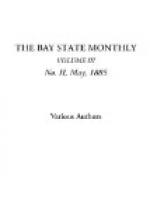Two minutes’ walk is sufficient to cross from the steamboat-pier over the narrow ridge of land to the beach. The difference between one side and the other is very striking. On the one is the still, dark water of Weir river; on the other, the open sea and the rolling surf. The beach at once impresses the visitor as being remarkably fine, and, indeed, it is equalled by none on the coast, unless, possibly, by Old Orchard. The sands are hard and firm, and at low tide form a spacious boulevard for driving or walking. Before the eye is the open sea, dotted here and there with glistening sails. The long, dark vessel which appears in the distance, about four o’clock on Saturday afternoon, is a Cunard steamer, which has just left East Boston for its voyage to Liverpool. For two or three hours it is in sight, slowly and majestically moving toward the horizon.
The scene on the beach is in marked contrast to what might have been witnessed a generation ago. Then one would have found here and there a family group just driven down in the old-fashioned carryall, and enjoying a feast of clam-chowder cooked over a fire of drift-wood. Now the beach is thronged by crowds of many thousands; immense hotels vie with those of the metropolis in grandeur; there are avenues and parks, flying horses, tennis-grounds, shops for the sale of everything that the city affords, and some that it does not, dog-carts and goat-wagons, fruit and peanut-stands, bowling-alleys, shooting-targets, and, in fact, as many devices to empty the pocket-book as are usually found at a cattle-show and a church-fair together. An excursion party has just arrived, but this occurs, sometimes, several times in a day,—for Nantasket is a Mecca to the excursionist. Societies and lodges come here; clubs resort hither for a social dinner; mercantile firms send their employes on an annual sail to this place, and philanthropists provide for hundreds of poor children a day’s outing on this beach.
Thus, there is no exclusiveness about Nantasket; but, at the same time, the tone of the place is excellent, and there seems to be no tendency toward its falling into disrepute, as has been the case with other very popular watering-places. It is, in fact, admitted by a New York newspaper that “Bostonians are justly proud of Nantasket Beach, where one can get cultured clams, intellectual chowder, refined lager, and very scientific pork and beans. It is far superior to our monotonous sand-beach in its picturesqueness of natural beauty, in the American character of the visitors, and in the reasonableness of hotel charges, as well as the excellence of the service.”




